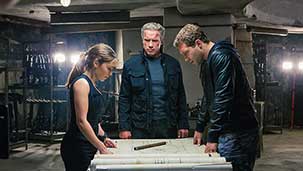It would be unfair to place the responsibility for the fiasco that is Terminator: Genisys entirely at your feet. It’s a film whose shortcomings are so varied, so composite, that they defy easy categorization. The special effects are degenerative—somehow less thrilling, less real, than they were twenty-three (!) years ago in Terminator 2: Judgment Day. The script unfolds like something the producers acquired through Fiverr—it has all the nuance and surprise of a crowdsourced piece of fan fiction. The production feels small-scale, constrained, cheap. Even the music – which occasionally pays tribute to Brad Feidel’s clamorous carillon theme – is so vacuous and forgettable that the film may as well have been scored by radio static.
All of this contributes to the feeling that Terminator: Genisys is nothing more than a great big B-movie (and not in the efficient, self-aware manner that that first Terminator was a B-movie). And what really solidifies the film’s lack of ambition is that you, Ronna, cast it like a B-movie. Amongst all its deficiencies, this is the most grievous: the lifelessness and lack of charisma that the actors bring to the screen. It’s almost impossible to comprehend.
Impossible, because there are Oscar-winners among the cast. And some terrific veteran character actors. Yet, together, they form a sort of tepid mass of humanity that doesn’t inspire even the smallest bit of affection (with one important exception, which, though obvious, I’ll wait to explain).
Yes, Emilia Clarke looks a bit like Linda Hamilton, and on Game of Thrones is able to conjure a matronly aura. But here she is doing a mere impression of being matronly, stuck somewhere between the Sarah Connor of the first film – a perpetually terrified damsel in distress – and the Sarah Connor of the second, all sinewy muscle and desperate authority. Clarke just doesn’t have the presence or the range to pull it off.
Jason Clarke, on the other hand, possesses...something. At least everyone who saw Zero Dark Thirty seems to think so. But when he’s given more than ten minutes of screen-time, his something is proven to be a finite resource. In Dawn of the Planet of the Apes, he was overshadowed not just by the troupe of CGI monkeys, but by virtually every other human performer as well. Here, as John Connor, the inspiring military leader who saves the human race, he inspires little more than indifference.
But the real centerpiece of this bromidic cast is Jai Courtenay, who now boasts a perfect two-for-two record in ruining beloved action franchises.
I will admit that Michael Biehn, who originated the role of Kyle Reese, is no Laurence Olivier. Still, there was something in the intense sincerity with which he delivered every line, that made him seem like he came from the future, like he really was sent back on a dangerous mission. He delivered every line like it was a matter of life and death.
Courtney delivers his lines like he is dead. To say that he has no presence is inaccurate. He is a void. Like a black hole, he swallows the charisma of every orbiting body. He simply doesn’t seem to occupy quantum space as we know it. He is a man-shaped nothingness. There might as well be a square-jawed, bro-shaped hole in the movie screen; revealing, behind him, all the pulleys that control the curtain, all the wiring for the surround-sound speakers. His reaction when Sarah Connor tells him the story of her parents’ death (“The cabin blew up!”) is the stuff that Internet memes are made from; if you’ve ever wanted to see what a man’s face looks like when he’s conscious of how his eyebrows are moving, just watch that scene.
But this isn’t some sprawling Robert Altman film. What do all these peripheral folks matter ? You see Jurassic Park movies for the dinosaurs, and you see Terminator movies for the Terminators. And, yes, there at the center of it all is Arnold Schwarzenegger, who, as he has aged, as his hair has greyed and delts have deflated, has somehow managed to become even more charismatic.
And that’s the miraculous thing about this fifth Terminator flick: that a franchise founded on the very inhuman blankness of it’s titular character could turn its blank, inhuman antagonist/protagonist into a complicated, evolving, sympathetic character. But it’s also the disappointing thing. Because this isn’t one of those sequels to a sequel to a sequel that has nothing new to offer the convoluted mythology. Terminator: Genisys introduces the very compelling idea of an aging Terminator confronting its obsolescence (“old, but not obsolete,” the T-800 keeps insisting), and Arnie brings that idea to life with a rather remarkable performance (every single ounce of charm this movie possesses is his). But the film is too busy trying to hit every action flick beat (specifically, every action flick cliché) to give that part of the story the attention is deserves.
So what are we left with? A series of inane expository conversations occasionally interrupted by some of the most unexciting, unimaginative action sequences in recent film history. Which wouldn’t be so interminable if the actors in the middle of those sequences had more charm than the cars and trucks and helicopters that were blowing up.
All it takes to elevate second-rate material is to put a magnetic presence in the middle of it. Arnold Schwarzenegger knows this. He’s built an entire career on it. It’s a shame you chose to surround him with such a deadly-dull gang of supporting players.
Sincerely,

Jared







